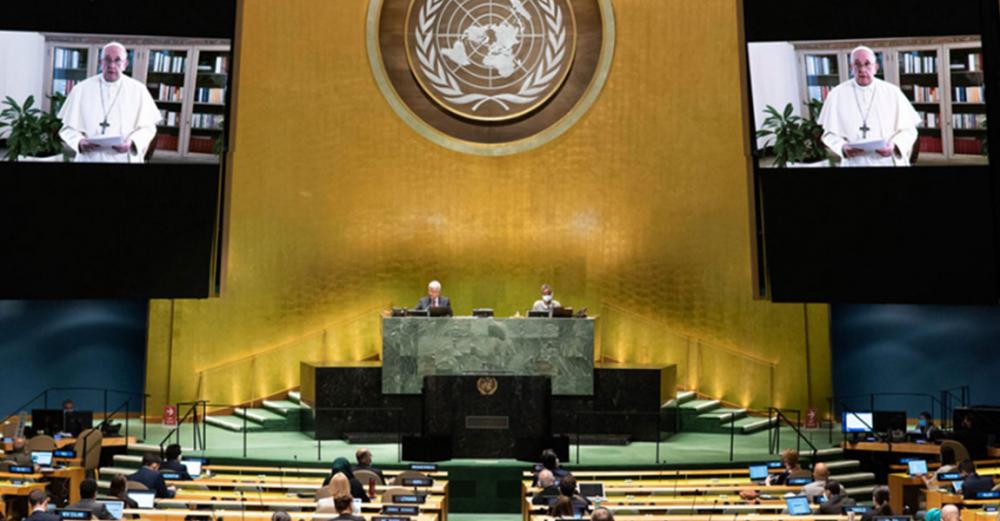Just Earth News | @justearthnews | 28 Sep 2020

New York: The COVID-19 pandemic is a trial, but also “a time to choose what matters and what passes away, a time to separate what is necessary from what is not”, Pope Francis told world leaders on Friday, in his virtual address to the UN General Assembly.
The Head of the Catholic Church, representing The Holy See, which is a UN Permanent Observer State, suggested that this crisis is also an opportunity to rethink our way of life, and systems that are widening global inequality. However, he warned that it could equally lead to a “’defensive retreat’ into greater individualism and elitism”.
The first path, continued Pope Francis, s one that leads to stronger multilateralism, global co-responsibility, solidarity, and peace, whilst the second emphasizes self-sufficiency, nationalism, protectionism, individualism and isolation, which would be “detrimental to the whole community, causing self-inflicted wounds on everyone”.
Solidarity must not be an empty word
Pope Francis, in remarks to the Assembly’s annual general debate, which is meeting virtually this year due to the pandemic, said that solidarity must not be an empty word or promise, echoing the UN’s call for an eventual COVID-19 vaccine to be available to as many people as possible. He asked that, if preference must be given to anyone, it should be the poorest and most vulnerable.
The virus, whose spread has been partly blamed by the UN on mankind’s encroachment on nature, showed the importance of avoiding every temptation to exceed our natural limits, according to the Pope
Another example of this excess is mankind’s use of technology, and both the pandemic and technology are, he declared, impacting employment, leading to : “an urgent need to find new forms of work truly capable of fulfilling our human potential and affirming our dignity”.
A change of direction
The world is confronted, continued Pope Francis, by a growing “throwaway culture”, which has, at its origin, a lack of respect for human dignity; a denial of human rights; and a craving for absolute power. Ultimately, he concluded, it is “an attack against humanity itself”, and requires a change of direction.
The pontiff described the continuing violations of human rights as painful, and a frightening picture of abused humanity. Religious followers, including Christians, endure persecution, including genocide, because of their beliefs, he said.
The growing scale of humanitarian crises, added Pope Francis, means that they now represent the status quo: today’s weapons are “wreaking havoc on cities, schools, hospitals, religious sites, infrastructures and basic services needed by the population.”
Conflict is one reason for many people being forced to leave their homes, and many displaced people end up in desperate situations, deprived of the chance to improve their lives, noted the Pope. Whilst he praised the UN’s Global Compacts on Refugees and on Migration as promising responses to this crisis, he warned that more political support is needed to ensure their success.
Now is also the time, according to the Pope, to ‘renew the architecture of international finance’, in order to reduce the growing gap between the rich and poor. This would involve investing in education and infrastructure, providing debt relief and development assistance to the poorest nations, as well as closing tax shelters, and tackling tax evasion and money laundering.
Turning to the climate, Pope Francis described the international community as having proved itself largely incapable of honouring promises made in 2015, as part of the Paris Climate Agreement. The burden of fighting climate change, he said, must not fall on the next generation.
Child protection
The COVID-19 pandemic has had a devastating effect on children, who are, said the Pope, suffering a dramatic increase in violence. School closures are, he added, leading to an increase in child exploitation in some parts of the world.
The Roman Catholic leader denounced the promotion of abortion as a humanitarian response to the pandemic: “it is troubling to see how simple and convenient it has become for some to deny the existence of a human life as a solution’.
He went on to urge civil authorities to ensure that children are not denied their human rights, and warned of the breakdown of the family which, he said, is reflected in “social fragmentation”.
Ceasefire ‘a noble step’
Pope Francis ended his speech by turning to the spectre of global conflict, and nuclear annihilation. He called for increased ambition on nuclear disarmament, and for the UN to be a more effective forum for world peace. The UN Secretary-General’s lobbying for a global ceasefire was praised by the Pope, as a “noble step” in this regard.
International sanctions, on the other hand, must be relaxed, he said, where they make it difficult for States to provide adequate support for their citizens.
The world has a duty, declared the Pope, to rethink the future of the world, with strengthened multilateralism, and cooperation between States:
“The United Nations was established to bring nations together, to be a bridge between peoples. Let us make good use of this institution in order to transform the challenge that lies before us into an opportunity to build together, once more, the future we all desire”.